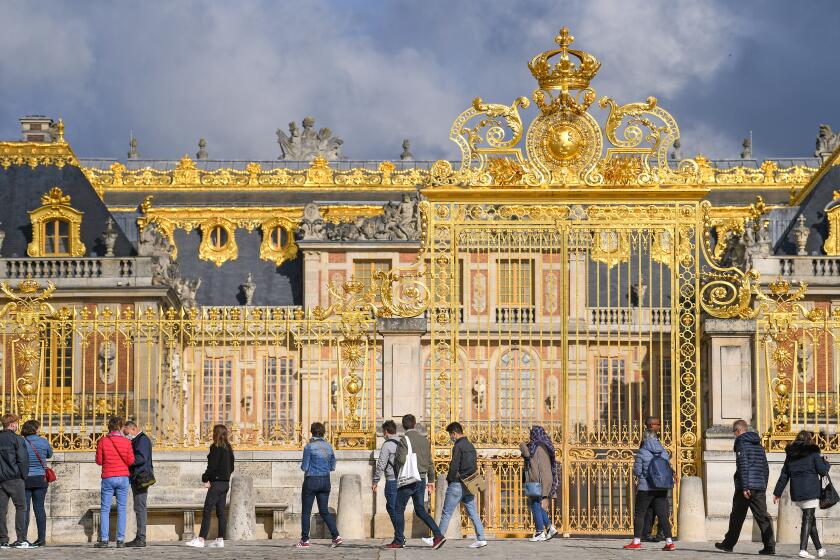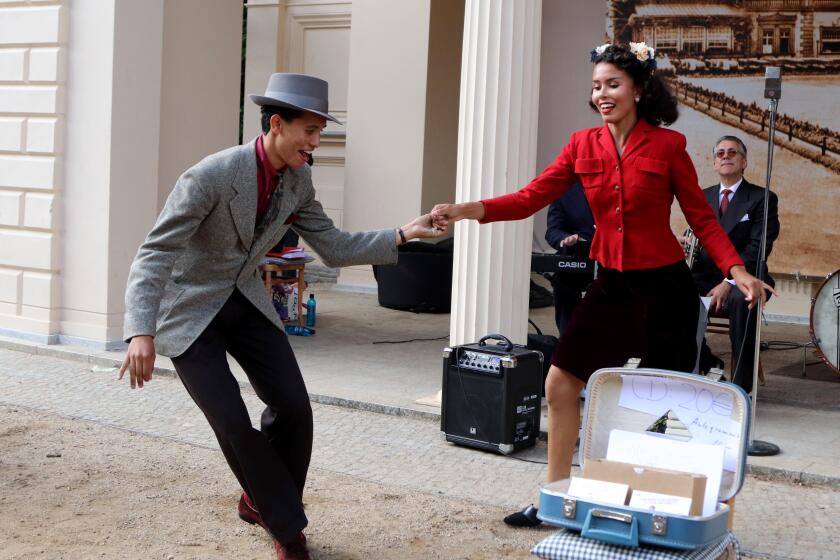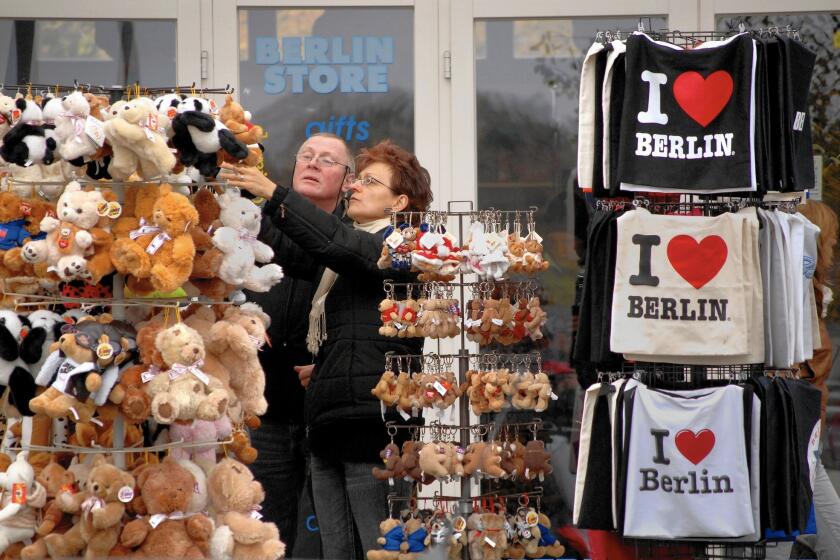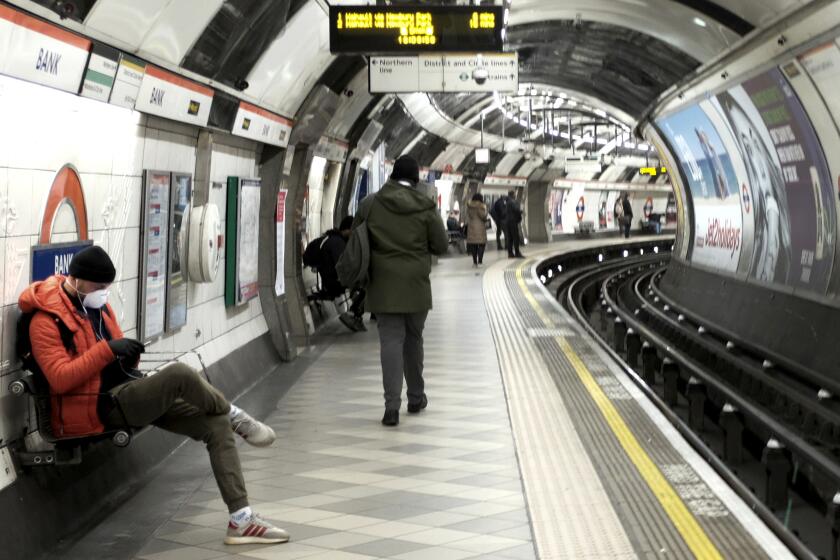Insults, walkouts, fist-banging: EU coronavirus summit drags into 4th day
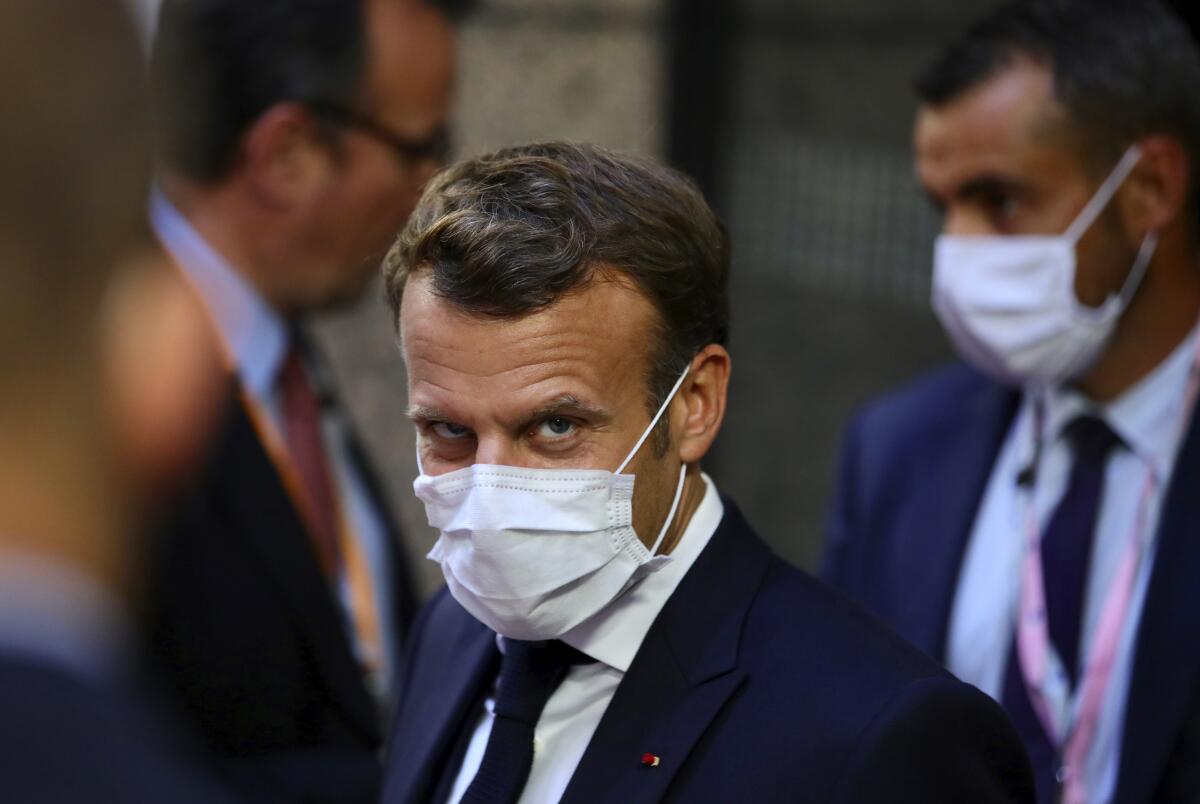
- Share via
BRUSSELS — Weary European Union leaders expressed cautious optimism Monday that a deal was in sight on their fourth day of wrangling over an unprecedented $2.1-trillion budget and coronavirus recovery fund, following a weekend of walkouts, flaring tempers and insults.
It took a heart-tugging dinner speech by EU Council President Charles Michel, French President Emmanuel Macron’s fist slamming in anger on the table and a new set of budgetary numbers to keep the epic summit going.
“There were extremely tense moments. And there will be more that no doubt will still be difficult. But on content, things have moved forward,” said Macron, stressing his continued partnership with German Chancellor Angela Merkel. Without Franco-German agreement, the EU has never taken momentous steps.
“An extraordinary situation demands extraordinary efforts,” Merkel said as the leaders headed into another day of one of the bloc’s longest summits ever. It had been planned as a two-day meeting and was scheduled to have ended Saturday, but deep ideological differences among the 27 leaders forced the talks into two extra days so far.
Overall, spirits had picked up since the talks reached rock bottom Sunday night.
“It looks more hopeful than when I thought during the night: ‘It’s over,’” said Dutch Prime Minister Mark Rutte, the target of much of the criticism.
Foreign visitors are vital to many European economies, which are clamoring — and competing — for tourists to return as coronavirus lockdowns ease.
Rutte, representing the views of a group of five wealthy Northern European nations — the Netherlands, Austria, Finland, Sweden and Denmark — sought to limit costs and impose strict reform guarantees. He came under criticism from Macron and the leaders of Italy and Hungary, whose Prime Minister Viktor Orban asked why the Dutchman had such “hate” toward him.
Rutte took it in stride.
“We are not here because we are going to be visitors at each other’s birthday party later. We are here because we do business for our own country. We are all pros,” he said.
On Sunday night, after three days of fruitless talks and with hope dimming, Michel implored leaders to overcome their fundamental divisions and agree on the budget and recovery fund.
The Swingin’ Hermlins, a German group dedicated to American big band music, vowed to play nightly online gigs till the end of the coronavirus crisis.
“Are the 27 EU leaders capable of building European unity and trust or, because of a deep rift, will we present ourselves as a weak Europe, undermined by distrust?” he asked the leaders. The text of the behind-closed-doors speech was obtained by the Associated Press.
“I wish that we succeed in getting a deal and that the European media can headline tomorrow that the EU succeeded in a Mission Impossible,” Michel said.
The pandemic has sent the EU into a tailspin, killing about 135,000 of its citizens and plunging its collective economy into an estimated contraction of 8.3% this year.
The bloc’s executive has proposed a 750-billion-euro coronavirus recovery fund, partly based on shared borrowing, to be divvied up as loans and grants to the countries hit hardest by the pandemic. That comes on top of the seven-year, 1-trillion-euro EU budget that leaders had been haggling over for months before the pandemic hit.
The European Union on Tuesday issued a list of 14 countries whose citizens will be allowed back in as visitors, but the U.S. did not make the list.
Even with Macron and Merkel negotiating as the closest of partners, the traditionally powerful Franco-German alliance could not get the quarreling nations in line.
At their dinner Sunday night, the leaders mulled a proposal from the five wealthy northern nations that would set up a coronavirus recovery fund with 350 billion euros in outright grants and the same amount again in loans. The five EU nations — nicknamed “the frugals” — had long opposed any grants at all, while the EU’s executive arm had proposed 500 billion euros in grants.
“We are ready to take the leap from loans to subsidies,” Rutte said.
All the EU nations agree that they need to band together, but the “frugals,” led by the Netherlands, want strict controls on spending, while struggling southern nations such as Spain and Italy say those conditions should be kept to a minimum.
Spanish Foreign Minister Arancha González Laya said that negotiations were at a “delicate moment,” but that Spain still expected that an agreement would be reached. Speaking to Cadena SER radio in an interview Monday, she said that Spain was open to a plan that came with strings attached.
“We do not reject conditionality, and we do not reject that there is good governance that offers trust,” she said. “What we do want is for that to have a framework, a framework that offers trust, clarity and transparency, which is the basis of a family’s relationship, same as the relationship within the European Union.”
Rutte has long been known as a European bridge-builder, but this weekend his tough negotiating stance was being blamed for holding up a deal. He and his allies have been pushing for labor market and pension reforms to be linked to EU handouts and a “brake” enabling EU nations to monitor and, if necessary, halt projects that are being paid for by the recovery fund.
“He can’t ask us to do specific reforms,” Italian Prime Minister Giuseppe Conte said, complaining that Rutte might look like a hero in his home nation, but nowhere else.
Unemployment and coronavirus: How do European countries protect jobs?
Rutte also wants a link to be made between the handout of EU funds and the rule of law — a connection aimed at Poland and Hungary, countries with right-wing populist governments that many in the EU think are sliding away from democratic rule.
That drew Orban’s anger.
“I don’t know what is the personal reason for the Dutch prime minister to hate me or Hungary, but he’s attacking so harshly and making very clear that because Hungary, in his opinion, does not respect the rule of law, [it] must be punished financially,” Orban said.
But Luxembourg Prime Minister Xavier Bettel said he would not budge on that point.
“To accept that our values are being cut, to have a Europe with values that are being cut and the rule of law being cut: It will be a ‘no’ from us,” Bettel said.
More to Read
Sign up for Essential California
The most important California stories and recommendations in your inbox every morning.
You may occasionally receive promotional content from the Los Angeles Times.
